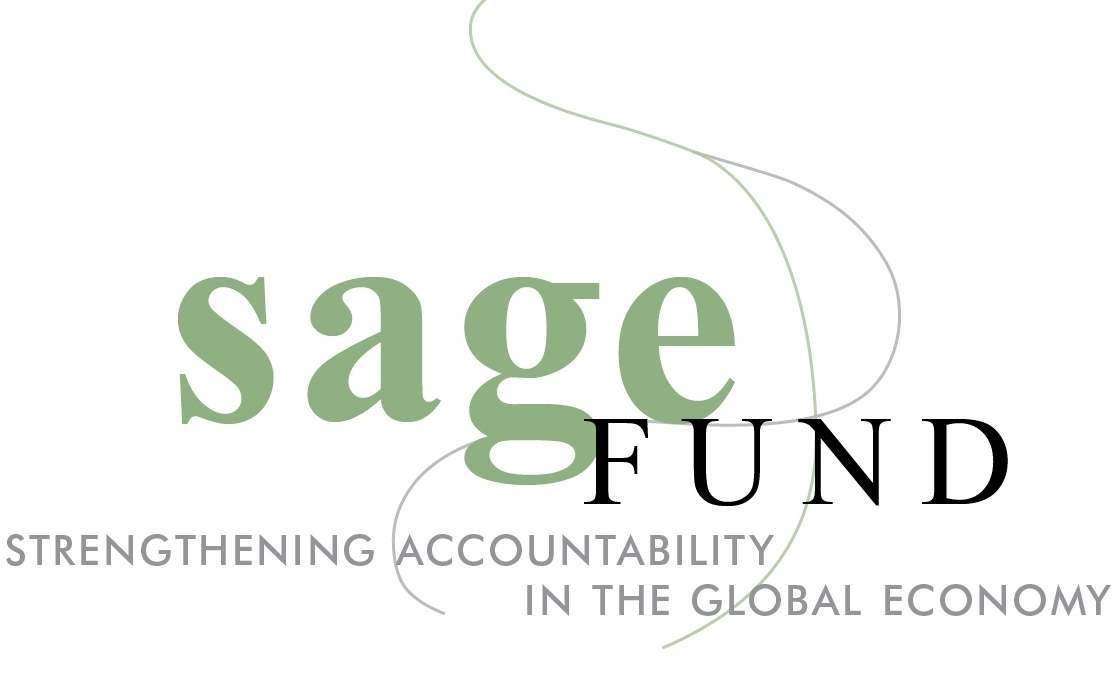grant round
Investment mapping tools
In November 2015, The SAGE Fund announced its first round of one-year grants in support of four innovative new tools for investment and supply chain accountability. Complex global supply chains often obscure the full range of corporate actors involved in financing and production, making it difficult to hold them accountable. By supporting the development of new tools for mapping investment and supply chains, the SAGE Fund hopes to help strengthen accountability across the whole chain of economic actors and remedy specific violations. By targeting hidden actors and closing information gaps, these tools have the potential to expose new pressure points for advocacy, create openings for using legal strategies and accountability mechanisms and strengthen oversight and regulation. Each is designed to enable affected communities and workers to engage and lead in the analysis and advocacy.
grant round locations
Investment Chain Mapping and “Follow the Money” Advocacy
This project will pilot a new investment chain mapping tool and “follow the money” advocacy approach to holding corporations and development finance institutions accountable for forced displacement and land rights violations in the Mekong Region. Using private financial databases, the methodology illuminates the investment chain of financial institutions and corporate actors behind land development deals. The tool will expose leverage points for legal and advocacy action and enhance the capacity of grassroots activists to deter and secure redress for land and resource rights violations. The tool and guide will be made available online.
organizations
Equitable Cambodia, equitablecambodia.org, Cambodia
Inclusive Development International (IDI), inclusivedevelopment.net, USA
CIRUM/LandNet, land.net.vn/eng, Vietnam
Land Core Group, Myanmar
Strategic Corporate Research and Campaign Development
This project will adapt and provide training on a new tool for corporate research originally designed for labor activists. The methodology uses publicly available information enabling affected communities and activists to gain a full profile of the corporation, identify leverage points, and create stronger campaigns employing an array of legal, policy and advocacy strategies. The tool will be adapted for use in mining conflicts, and will be piloted with affected communities in Latin America. It will be made available online in Spanish, English and Portuguese.
organizations
Latin American Observatory of Environmental Conflicts (OLCA), olca.cl, Chile
Latin American Observatory of Mining Conflicts (OCMAL), conflictosmineros.net, Chile
Mining Watch Canada, miningwatch.ca
Above Ground, aboveground.ngo, Canada
CHALLENGING THE “DISCLOSURE GAP” AND INVESTOR ADVOCACY
This project aims to develop a methodology for holding corporations accountable to their environmental obligations and raise awareness amongst investors to scrutinize management claims about environmental compliance. The proposal builds on corporate research completed by CER on companies listed on the South African stock exchange (JSE), which exposes discrepancies between violations on the ground and claims in corporate filings and reports to investors. The next step is to determine if companies are in breach of legal or accounting requirements by “under-reporting” on their environmental obligations, and exploring the potential for regulatory action or litigation in response. CER will develop and disseminate a tool and guide on the new methodology.
organization
Centre for Environmental Rights (CER), cer.org.za, South Africa
WORKER-LED MODEL FOR SUPPLY CHAIN ACCOUNTABILITY
This project brings together seven organizations to launch a Worker-Driven Social Responsibility Collaborative (WSR Collaborative) to expand, promote and replicate the WSR model in supply chains around the world. This proposal is an outgrowth of the pioneering work of CIW, taking the lessons learned from its Fair Food Program and Campaign to provide a resource for other groups around the world to develop a similar model for binding and effective, worker-led human rights accountability.
organizations
National Economic and Social Rights Initiative (NESRI), nesri.org, USA
Workers Rights Consortium, workersrights.org, USA
Business and Human Rights Resource Centre (BHRRC), businessandhumanrightsresourcecentre.org, UK
Coalition of Immokalee Workers (CIW), ciwonline.org, USA
Fair Foods Standards Council (FFSC), fairfoodstandardcouncil.org, USA
T’ruah, truah.org, USA
Migrant Justice, migrantjustice.net, USA
2020 Mexico City Convening
Strengthening & Scaling Tools for Corporate Accountability
In January 2020, the SAGE Fund brought together a cross-section of organizations, including those listed above as part of SAGE’s first round of grants, that have developed research and advocacy tools for strategic corporate research, investment or supply chain mapping, and financial sector advocacy. The objective of the learning convening was to explore the ways in which these tools equip affected communities and civil society organizations to identify more powerful pathways for holding corporations and other economic actors accountable for human rights and environmental harms from their investments. Based on this stocktaking exercise, the meeting identified opportunities for further strengthening the impact and scaling the use of these tools.
• Learn more about the convening
• Explore the various tools and their impacts





